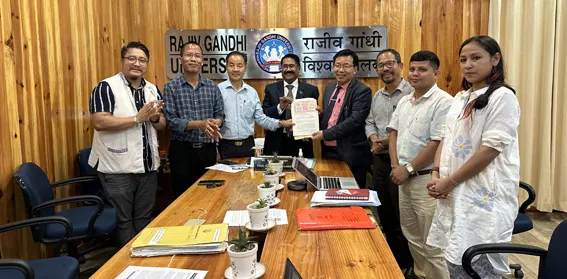RONO HILLS, 26 May: Rajiv Gandhi University (RGU) here signed a memorandum of understanding (MoU) with Germany-based University of Tuebingen in the virtual mode on Thursday.
“The agreement aims to support joint research on the ecomorphological radiation of the rove beetle subfamily Steninae (Coleoptera, Staphylinidae) in the unexplored regions of Arunachal Pradesh,” the RGU informed in a release, adding that “this collaboration brings together Prof Oliver Betz from the Institute of Evolution and Ecology at the University of Tuebingen and Dr Hiren Gogoi from the zoology department of RGU.”
Following the signing of the MoU, RGU Registrar Dr NT Rikam, Finance Officer Prof Otem Padung, Life Sciences Dean Prof Sumpam Tangjang, and Zoology Department Head Dr Daniel Mize delivered introductory lectures.
“All participants, including RGU Vice Chancellor Prof Saket Kushwaha, Prof Betz, and Prof Harter, expressed appreciation for this international collaborative research initiative focusing on the Steninae group of Rove beetles (Staphylinidae) and their ecology in the unexplored Arunachal Himalaya region,” the release stated.
RGU Joint Registrar (Academic) Dr David Pertin presented the draft MoU, which was agreed to by Prof Betz and Prof Klaus.
“As part of the agreement, RGU will provide Dr Jörg Oliver Betz with an official research stay and laboratory space to closely collaborate with RGU’s zoology department in the RGU campus,” it said.
“While students and staff under Dr Hiren Gogoi’s guidance will assist Dr Betz during fieldwork in Arunachal Pradesh and adhere to a standardised collection protocol in compliance with the rules of the National Biodiversity Authority of India, the German side will ensure the availability of funds, which Dr Jörg Oliver Betz will arrange from the home university or other sources,” the release said, and added that “these funds will cover expenses, including payments to RGU collaborators involved in on-site collection and travel costs.”
In addition to the MoU, an agreement for material transfer was also established, following the rules of the Biological Diversity Act, 2002, and the National Biodiversity Authority of India. “Both parties have committed to abide by the laws of the Indian government,” the release said.
“Dr Padung expressed the possibility of expanding the research focus to include other insect groups in Arunachal Pradesh, given the region’s rich biodiversity,” the release added.



